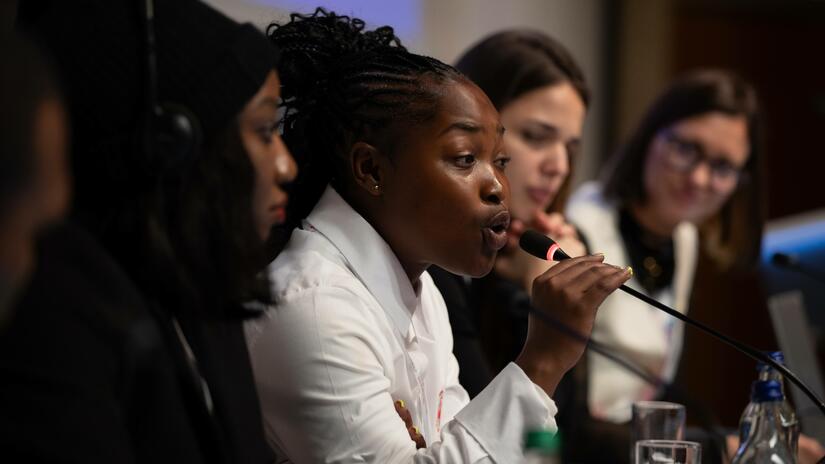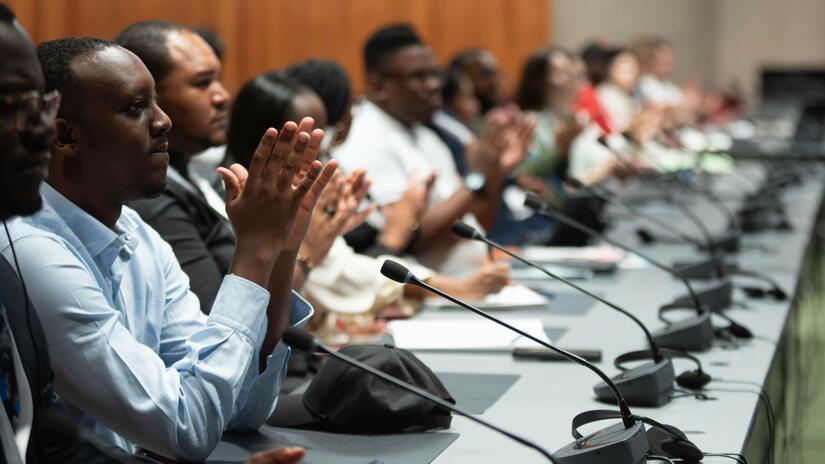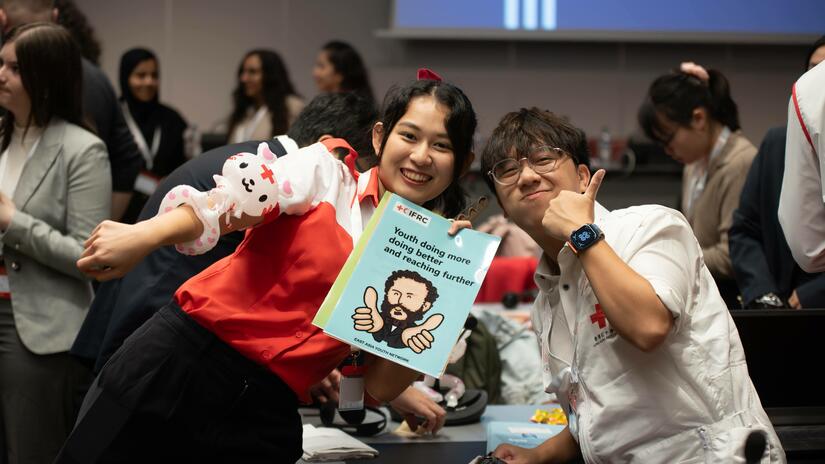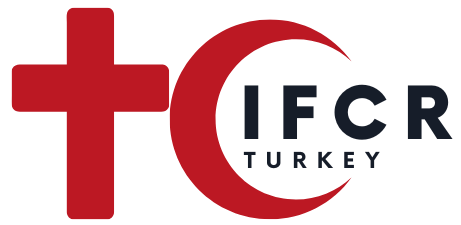From Geneva, with love: Red Cross Red Crescent meetings kick off with call to protect humanitarian workers and to put young volunteers in the driver’s seat
The 34th session of the IFRC General Assembly brings 191 Red Cross and Red Crescent National Societies together in Geneva, Switzerland, from 23 to 25 October.
As Red Cross and Red Crescent representatives from around the world gathered in Geneva, Switzerland yesterday, IFRC president Kate Forbes laid out what is at stake for humanitarian workers and people impacted by natural disasters, conflict and other crises.
“Today, our work is increasingly difficult,” she told the gathering. “Global conflicts have escalated, endangering civilians and our volunteers, making it even more difficult to deliver humanitarian aid.
“The surge in violence against humanitarian workers underscores a decline in the adherence to international humanitarian law and poses a direct threat to our mission.”
In 2024 alone, she noted, the IFRC network of National Societies has lost 30 of its volunteers in the line of duty. The most recent death was a Sudanese volunteer named Sadel, killed while providing life-saving assistance at his local hospital.
“Each loss is a deep one for both the communities we serve and for our global network, weakening our ability to support those in need — but not weakening our resolve to directly address these crises,” she continued.
As part of its ongoing efforts to protect humanitarian workers, the IFRC launched the Protect Humanity campaign earlier this year to build awareness and rally support with protection of volunteers and staff.
During the opening ceremony for the Statutory Meetings of the International Red Cross and Red Crescent Movement, which include the General Assembly, The Council of Delegates and the International Conference, Forbes also announced the establishment of The Red Family Fund, designed to provide financial support to the families of those who have died in the line of duty.
“This is a tangible step that demonstrates our commitment to honor those who care for others,” she told those gathered.
The president of the International Committee of the Red Cross (ICRC), Mirjana Spoljaric, also spoke at the opening ceremony. She stressed the urgent need to protect people living in places impacted by conflict and violence and she emphasized the critical role National Societies play in supporting and accompanying communities in their path toward recovery.
Audience members were also given a chance to express themselves as participants responded to critical humanitarian questions via mobile phone apps. The responses were used to generate online surveys and even a word cloud that envisioned a future centered on youth, community, resilience, and innovation.
Youth Forum sets the stage
Setting the stage for the General Assembly, the 2024 IFRC Youth Forum got underway on 22 October with 85 Red Cross and Red Crescent youth representatives from around the world participating.
“I want to congratulate you for speaking up for young people,” IFRC Secretary General Jagan Chapagain told the gathering, adding that he remains committed to ensuring that young volunteers and leaders play a key role in influencing strategy and decision making. “It’s time for you, as young leaders, to show us the way.”
The outgoing chair of the Youth Commision, Bas van Rossum, agreed. Van Rossum was the youngest person to have ever served as youth representative on the IFRC Governing Board as chairman of the Youth Commission.
Now, nine years later, he steps down as president of IFRC’s Youth Commission, but he still champions the role of youth in setting the course of humanitarian response.
“Young people are perhaps the closest to the front lines,” he said, in a special episode of the People in the Red Vest podcast, recorded as the Youth Forum was underway. “So, it’s really important that we listen to young volunteers and that we give them space to really shape the direction we’re heading.”

A participant in the IFRC Youth Forum makes a point during a panel discussing the IFRC Youth Engagement Strategy
Photo: IFRC
Fostering youth leadership
The forum was also a chance for young leaders to meet directly with senior IFRC leadership. Milena Chacón from the Costa Rican Red Cross moderated a panel with IFRC President Kate Forbes, who talked about a wide range of issues, including migration challenges in her home state of Arizona, in the southern United States, focusing on the trauma faced by children.
She highlighted a program by a young Mexican Red Cross volunteer that helps migrant children express their feelings. Forbes shared her journey from local volunteer to president of the IFRC, emphasizing the Red Cross’s role in developing management skills and youth engagement.
Forbes also addressed the need for diversity in youth councils, advocating for gender balance and inclusion of people with disabilities to inspire more diverse leadership.
For their part, the young volunteers in the audience expressed the importance of being involved in diverse parts of the network, and the importance of having a voice in finding and implementing global solutions.

Participants in the IFRC Youth Forum listen to a panel discussion on the IFRC Youth Engagement Strategy
Photo: IFRC
Youth Engagement Strategy 2024
One panel discussion led by Maryna Kozhedub, a volunteer with the Ukrainian Red Cross Society, explored the challenges young people face today.
Luciana Marino from the Argentine Red Cross discussed three key issues affecting young people in South America: poverty, unemployment, and migration. She noted that poverty and unemployment often contribute to migration.
Djamira Zorom from the Burkinabe Red Cross Society described the challenges that female leaders face in Africa. She explained that she had to work hard to gain the trust of her superiors and prove herself as a capable woman in a leadership position.
Johnson Apamumu from the Papua New Guinea Red Cross highlighted the generational gap as a significant issue facing young people. He emphasized the need for a more open and understanding environment between generations.

Volunteers attending the IFRC Youth Forum give a thumbs up as they hold up an IFRC document on youth participation.
Photo: IFRC
What is the IFRC General Assembly?
As the supreme body of the IFRC, the Assembly meets every two years and determines the vision and strategy of the IFRC, and the general policies that govern the International Federation and the National Societies.
Key elements such as trust and integrity, localization, volunteering and investing in National Societies have guided the preparations for the Statutory Meetings, which will provide an opportunity to discuss how we can remain relevant as an organization.
This year, the Assembly took place along with an International Conference of the Red Cross and Red Crescent Movement, which is hosted along with the International Committee of the Red Cross.




